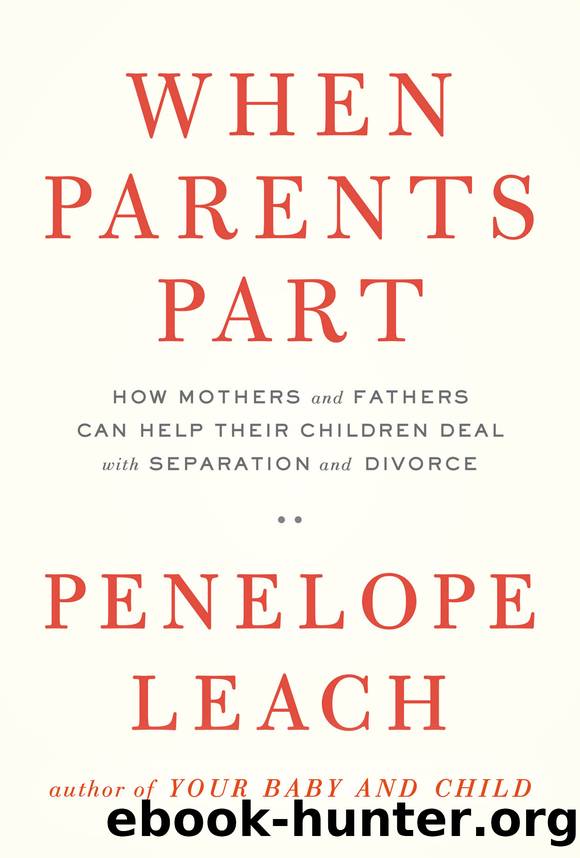When Parents Part by Penelope Leach

Author:Penelope Leach [Leach, Penelope]
Language: eng
Format: epub
ISBN: 978-1-101-87405-9
Publisher: Knopf Doubleday Publishing Group
Published: 2015-05-12T00:00:00+00:00
Grandmother of girl, aged three
âMaryâs not four yet. She canât get her arms around the mailbox that stands outside her front door, but itâs a sturdy, familiar landmark, and sheâs going to hang on to it whatever all the grown-ups say about Daddy taking her for a treat. I think she knows sheâs being conned. Treats have Mommy in them. Or me. Or maybe Lucyâs mom (sheâs good at treats).â
Yet another year or two on, at four or five, that shyness with and reluctance to go with a scarcely known visiting father may take on a desperate intensity, with the child tearful and panicky when the father comes to pick her up. The extreme reaction is usually not to being with the father but to being taken away from the mother. Look at it from the childâs point of view: Daddy left, so how can she be sure that if she takes her eyes off Mommy, she wonât leave, too (see chapter 8)?
A scene like that is agony for everybody. For the child, who is submerged in the worst kind of fear there is for a child that age: fear of losing her main attachment figure. For the mother, who hates to see her so upset (and hates the father for making her that way), and of course for the father, who is being made to feel like an insensitive brute for wanting to spend time with the daughter he loves. Probably nobody meant father and child to become alienated, but they have.
If a childâs relationship with his or her father is protected and facilitated from the beginning, even though the two of them donât live in the same house anymore (see chapter 5), painful separation scenes like this can usually be avoided. But not always. Separation anxiety is ordinary in one- to three-year-olds and by no means unusual for another two or three years, especially when family stresses make children feel insecure (see chapter 8). But if it is not unusual for âcontact arrangementsâ to blow up, it is vital not to abandon contact altogether. For babies, toddlers, and preschool children there is one particular solution thatâs guaranteed from the childâs point of view, though it can be tough on parents: let her father come to the childâs home to spend time with her and, if necessary, have Mom hanging around in the background so she feels safe.
Understandable though Maryâs motherâs feelings are, they belong to her own adult relationship as woman-to-man, not to Maryâs relationship with her father. Some agreed-upon grown-up ground rules might help in situations like these. For example, you might agree that child and father stay downstairs or in the bit of the home where she normally plays; that he uses the downstairs bathroom and doesnât go upstairs; and that he only gets cups of coffee if you offer.
Download
This site does not store any files on its server. We only index and link to content provided by other sites. Please contact the content providers to delete copyright contents if any and email us, we'll remove relevant links or contents immediately.
Cecilia; Or, Memoirs of an Heiress — Volume 1 by Fanny Burney(32549)
Cecilia; Or, Memoirs of an Heiress — Volume 2 by Fanny Burney(31948)
Cecilia; Or, Memoirs of an Heiress — Volume 3 by Fanny Burney(31932)
The Great Music City by Andrea Baker(31917)
We're Going to Need More Wine by Gabrielle Union(19036)
All the Missing Girls by Megan Miranda(15965)
Pimp by Iceberg Slim(14489)
Bombshells: Glamour Girls of a Lifetime by Sullivan Steve(14059)
For the Love of Europe by Rick Steves(13949)
Norse Mythology by Gaiman Neil(13350)
Talking to Strangers by Malcolm Gladwell(13350)
Fifty Shades Freed by E L James(13233)
Mindhunter: Inside the FBI's Elite Serial Crime Unit by John E. Douglas & Mark Olshaker(9325)
Crazy Rich Asians by Kevin Kwan(9280)
The Lost Art of Listening by Michael P. Nichols(7494)
Enlightenment Now: The Case for Reason, Science, Humanism, and Progress by Steven Pinker(7306)
The Four Agreements by Don Miguel Ruiz(6747)
Bad Blood by John Carreyrou(6613)
Weapons of Math Destruction by Cathy O'Neil(6267)
